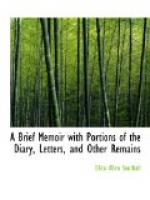his lips moved a little, a word could not be heard.
His face was sunk and pallid, his breathing uneasy,
and his eyes were closed. After a short time
we left, and at four o’clock in the morning,
without a struggle, his spirit passed quietly away
to his “eternal inheritance.” “They
that turn many to righteousness shall shine as the
stars for ever and ever.” I never, I
believe, shall forget how forcibly came to my mind,
as I sat beside his lifeless form, the words, “To
this end Christ both died, and rose, and revived,
that He might be Lord both of the dead and the living,”
and my thoughts turned on many a solemn and blessed
trust implied in them.
Her uncle, Samuel Rundell, died on the 4th of 5th Month, 1848, at the age of eighty-five. In the Annual Monitor for the following year is a short Memoir of his life.
It had been for some years a frequent occupation with Eliza, together with her sisters and cousins, to spend the long winter evenings with her aged uncle and aunt, and after the decease of the former these attentions were more constantly needed by the survivor. It was striking to notice Eliza’s cheerful alacrity to relinquish, when her turn came round, her favorite pursuits, often for some weeks together, in order to comfort and enliven the declining days of this aged relative.
7th Mo. —th. My mental condition a quiet but not painless one. I had been much favored, though in pain and trouble, amidst which I had a kind note from J.T., who says, “When at Liskeard, and since, I have believed that it might be said unto thee, ’The Master is come, and calleth for thee;’ and I wish, if thou hast been made sensible of this, it may be thy very earnest concern to sit at His feet in great humility of mind, that thou mayst hear from season to season the gracious words that may proceed as out of His mouth. It may be that in the ordering of His gracious designs, He may see fit, as He has done with many others, to allure thee and bring thee into the wilderness; but I have no doubt that He will also give thee vineyards from thence, and thou wilt be made sensible that indeed it is His own right arm that has and will bring salvation unto thee” Though at present incapable of feeling as I have done, yet, being desirous of finishing up my Journal, I must acknowledge that great and gracious have been the dealings of my heavenly Father with me, causing me to rejoice in Him who has done for me “exceeding abundantly above all that I could ask or think,” chiefly in the way, which I have found a very blessed way, of enabling me to give up my own will to His, and to be subject in things little and great to Himself. As far as I have known the yoke of Christ, it is indeed a sweet and easy yoke; and the chiefest sorrow which I have found during my endeavor to bear it has been from my aptness to throw it off. The worst of snares are the most secret.
We are now quietly and unexcitedly at




